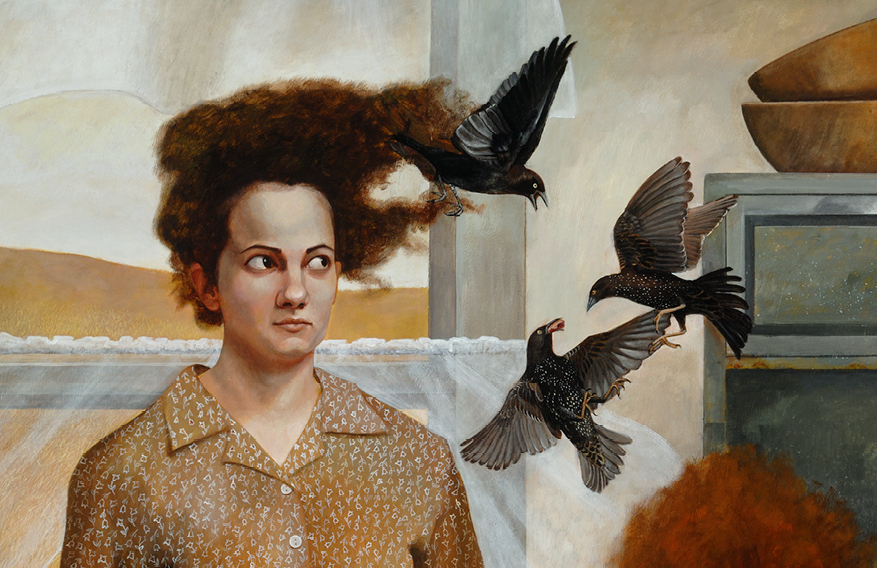okey-panky
Struck by a Momentary Blindness
Three poems by James Hoch

Struck by a Momentary Blindness
Swap Meet
This morning, sitting at the table,
while she chews on toast, it occurs
that if you enjoy watching someone chew
you should give your soul to them.
But sharing a soul is more like splitting
tuna salad. Which I love for nostalgia
of metal superhero lunchboxes, and also
oceans, but hate on the breath of others,
even my wife’s carries the backwash.
It’s like returning a mirror to the store.
I say. Ha. Ha. She says, Not really.
More like a swap meet of sameness.
Going on, not knowing why we go on,
becomes its own pleasure. Come again.
Once I found an apricot on the island
in our kitchen and bit it in half, and felt
like my tongue held enough sun and root
I was overtaken, and wanted to leave
the other half for my wife, as if we could
trade whatever angularities of kindness
and sadness live inside us. Which was
a mistake, I realized before halfway out
the door, the way God mistakes prayer
for suggestion, the way a gift becomes
a box you haul room to room, looking
to set it down in the place it belongs.
So I turned back, ate the rest of the apricot
and woke my wife kissing her a long while.
I never told her this — I am not going to–
there are days I wait for some taste
of the world slow on her tongue.
Refusal
Today you set the gun down in the mouth
of the bathroom sink. It’s not every day
you are this hopeful. You sit on the can
and spelunk awhile. What now?
You have no idea how long now is.
Now unravels inside you; it is not easy to let go.
Then, Leshko’s! Breakfast. You head out
lucky, not feeling lucky, umbrella in a late snow.
By the door, a white pickle bucket, and you
forgetting what kept you from ending
so unilaterally, the odd fork taste the barrel left.
No matter, you are hungry for eggs, kielbasa,
a plate of kasha in gravy. It’s like the meal
before your sentence, but are low on cash
and between want and means you drift
like smoke in a bedroom filled with night.
Out in the streets, you used to see galoshes
sloshing the curb. Now, only the word,
the afterlife of seeing. And it occurs–
you love galoshes and seeing, and how cupula
makes umbrellas architectural, then like palms
blooming and collapsing. No, it is not enough
to love words; you must keep your head too,
like people moving through snow, refusing.
You are one of them now. You salt and sweat.
You can’t get too much of this—Not now,
not with your hands carrying the feel of what
you last touched. Not with your mouth, your gut,
the small busy flames licking inside,
the day floating in a slush of blue.
Tug-of-War
There’s that moment when the cocky
line up against a cosmology of the dorky,
and the flag jerks and seizes and the border
between sweeping triumphalism and wedgie
shifts. Or, mercifully, the drawn exhaustion
when both collapse, one a little more heapish,
and the moment, a fly you swat away,
returns, a lousy holiness. Of course,
there are limits to allegory. Our lives,
like our wars, manufactured off-shore,
and the fates —what were their names
D’Angelis, Jakoby — how we loved that
they smelled like The 70’s, like the liars
we aimed to make ourselves, and loved too
their predictable interventions, that one
would eventually take pity, one would not
want the truth to be known, none such,
so took it upon herself to call time,
call us in, humbled, regaled, unfinished
and take our seats in the orange cafeteria.
It seems like a long time ago; we were there,
long before we understood much of this,
when living was easier because we didn’t know
what we lived through would last a life.
Perhaps, this is why one doesn’t often find
the middle aged scrawling the names
of loved ones over their clavicles, and how
quick you claim your inner chicken shit
every time some thug calls your bluff.
And why your wife catches you gazing out
the car window as a woman whose body is
so far beyond your own crosses the street
and out of politeness, since you are on a date,
you pretend that you can not see at all,
that you’ve been struck by a momentary
blindness, that you are willing to fake
ailment to avoid being implicated in desire.
You are heading to a movie, the first since
the boys, and a dinner where you are supposed
to discuss the nuances of the film,
how it was predictably sad and beautiful,
that sadness is necessary for beauty,
then charge the writer with emotional fraud.
But all you will do is talk about the boys
how much you love and worry them
into the misshapen expression of worry.
Perhaps you will end up having sex
and it will feel faintly raw and unrelenting.
Or, poor goat, you’ll stumble and say
something that hurts her in the way
that hurt reminds her of a river, and you
heavy-lidded in your dull waders.
Either way, you know how the night ends
a little queasy so reach across the seat,
hand in her lap, shrewd and warm,
just as the light changes and returns.
You want to say all this talking about war
and love amounts to conversing with the gods,
but you know the gods are in dispute
and nothing you say saves you, the frank
and unkindly truth may not be enough for gods
busy tying a scrap of cloth on a line. And you
lounging in your boxers hammocked
between the limbs of a crooked locust
watching the day tug by amid giant shears
are not immune from the day kissing you
as you sway through its cool passage.
“Because We Can’t Be Trusted to Hurt Ourselves,” by Roblin Meeks








